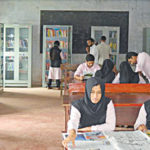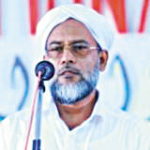Al Ghaith Wafiyya College – a women-only Islamic seminary in Kerala, conducted a one-of-its kind convocation ceremony for its female graduates who had successfully completed a five-year course in Islamic studies coupled with a Bachelors from a recognised secular university.
By Muhammed Nafih
At the beginning of August, Al GhaithWafiyya College”a women-only Islamic seminary in Kerala”conducted a one-of-its kind convocation ceremony for its female graduates who had successfully completed a five-year course in Islamic studies coupled with a Bachelors from a recognised secular university. The unique ceremony was exclusively of women, by women and for women, with each and every task from microphone operation through presenting to the valedictory speech being handled by women.
What was unprecedented and groundbreaking about the graduation ceremony was that as many as 111 female graduates received their sanad “ which formally endorses them as Islamic scholars. Sanad is traditionally conferred on male scholars on their completion of Islamic studies from a recognised seminary, formally authorising them to take up teaching and other scholarly responsibilities as well as to officiate at religious events and offer pastoral services.
By offering sanad to its female graduates, the seminary was sending out a strong message: women are reclaiming their rightful place in the enterprise of Islamic scholarship.
The seminary, the brainchild of Abdul Hakeem Faizy, a visionary scholar and a highly enterprising education activist in the state, has not only made Islamic higher studies accessible to girls, but also devised an eclectic blend of traditional Islamic knowledge and modern secular education.
A Distinctive Curriculum
A strong advocate of integrating religious and secular studies, Faizy is the architect of a distinctive curriculum and syllabus, combining traditional and modern Islamic studies and modern education. His concept is currently being implemented in more than 60 seminaries run by the Muslims in the state, under the auspices of the Co-ordination of Islamic Colleges (CIC), a governing body functioning as a university. They include around 15 all-women seminaries, known as Wafiyya colleges.
The female graduates are known as Al Wafiyya (loosely translated as the committed women), in line with the traditional and still widely prevalent practice in India of naming religious scholars after the seminaries where they studied and obtained their sanad.
Islamic Studies and an Appreciation of the Modern World
The curriculum at all these seminaries accords top priority to blending classical Islamic education with a solid grasp of contemporary science. The aim is to produce religious scholars who are not only equipped with an in-depth knowledge in the various disciplines of Islam, but also with a sophisticated understanding of the scientific, cultural, political and intellectual currents that shape our modern world.
The female graduates who successfully complete their course are well-versed in all traditional and modern areas of Islamic study such as Quran exegesis, Hadith studies, jurisprudence, comparative studies of religions etc. In addition, the seminary makes it mandatory for each student to complete at least a Bachelor’s degree from a recognised university.
The formal convocation ceremony, which was held several years after the first batch of female graduates passed out of the seminary, was an opportunity for the institution to highlight its progressive mission and objectives. These women scholars have already started making their mark in the society in multiple roles. Some of them are working as teachers and lecturers, not only in other seminaries, but also in secular schools and colleges. Among the Wafiyyas, there are also writers, orators and active social workers. Thanks to this latest initiative, a vibrant tradition in Islamic history, one in which women were actively encouraged to pursue religious studies and excel as scholars, is currently being revived.
Questioning Ossified Cultural Norms
Faizy maintains that there is no better way of empowering Muslim women than to educate them and give them access to all streams of knowledge, including Islamic theology where they proved their mettle in the first centuries of Islam. He blames certain reactionary practices and social customs for using faith as a pretext to block woman from education, reiterating that it is not religion per se, but certain ossified cultural norms masquerading as religious decrees that prevent women from scaling new heights in areas of their choice.
(Extracted from qantara.de)



COMMENTS